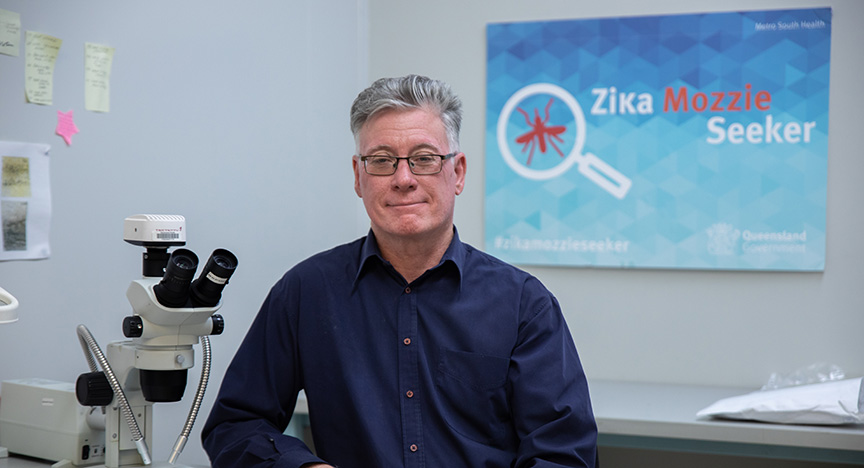
When people think of health services, they often don’t think of insects… but here at Metro South Health, we have our very own entomologist – someone who specialises in the study of insects (but not spiders, mites or ticks).
Brian Montgomery is the medical entomologist in the Metro South Public Health Unit (MSPHU).
Medical entomologists are responsible for managing insects that have impacts on human health, such as mosquitoes.
Brian’s fascination with insects started as a child.
“I had a general fascination for the insects in my back yard – what are they, where do they come from, what are they doing, why are they here?” Brian said.
“Observing them close-up appealed to my interest in genres of science fiction and horror.
“Eventually, this led me to study a Master of Science (Research) at The University of Queensland."
The role of a medical entomologist ranges from specialist advice to program management for the surveillance of target viruses and mosquito species, as well as disease management.
It changes depending on the region you are employed in and whether you are employed by a council or a health department.
“At Metro South Health, my focus is on invasive urban mosquito species,” Brian said.
“My role involves lots of writing, data scrutiny, project management, and collaboration to deliver and improve the system that keeps people safe.
“In 2017, a Metro South Health research grant enabled me to assemble a small team of temporary part-time staff, made up of a medical entomologist, public health officer, engagement officer and IT guru (Data Systems and Application Specialist), to launch Zika Mozzie Seeker.”
Zika Mozzie Seeker (ZMS), which Brian describes as one of the highlights of his career, is an award-winning novel citizen science project which tasks citizens within the Metro South region to set up an egg trap in their backyard.
Around two weeks later, they return it back to MSPHU for PCR testing by Queensland Health’s Forensic and Scientific Services.
Zika Mozzies are two mosquito species – Aedes aegypti and Aedes albopictus – known to carry Zika Virus, Dengue fever and chikungunya.
These mosquitoes are invasive and South East Queensland is considered highly vulnerable to invasion, with Aedes albopictus found in island communities of the Torres Strait.
“Checking thousands of yards and spraying inside thousands of houses over many years of dengue outbreak control in North Queensland has convinced me that people-power is the solution to effective urban mosquito monitoring," he said.
“With ZMS, we morphed our council partnership program that monitors commercial precincts into a citizen science platform to monitor a much larger region, including residential areas.”
ZMS is offered twice a year and Round 13 is currently open for recruitment, with egg traps due to be mailed out to participants in early November.
Participation is free and simple – if you would like to get Zika seeking and check that there are no Zika mozzies in your backyard, register here today.
The great work by ZMS has continued to be noticed, with a mention in the recent Queensland Public Health Review.
Brian also provided an update of ZMS at the recent national mosquito conference and will present at the upcoming Australian Citizen Science Association conference in November.